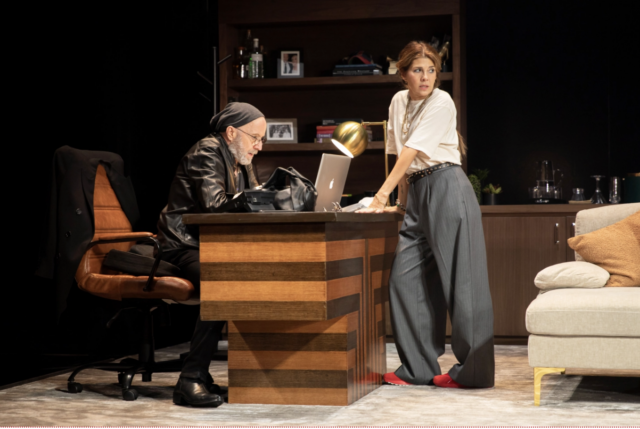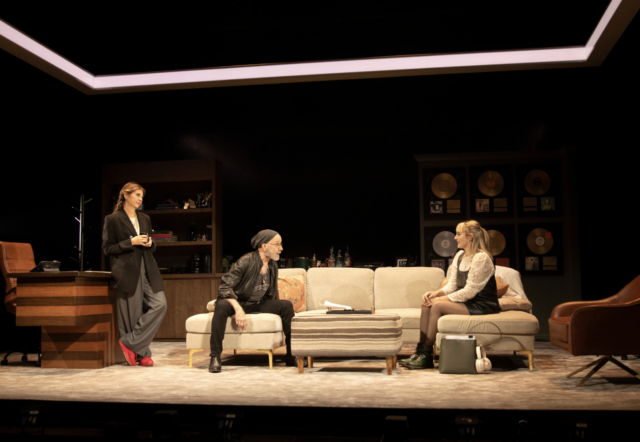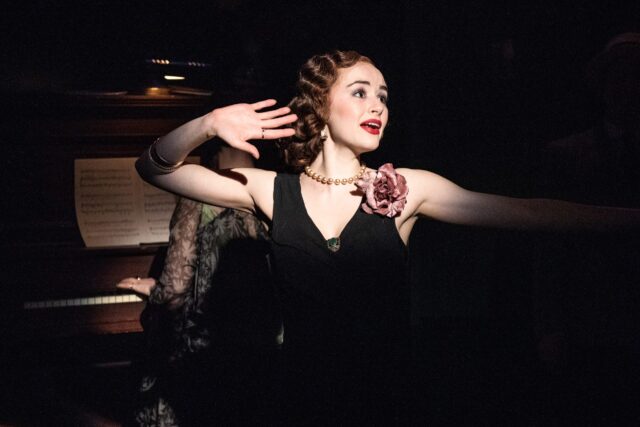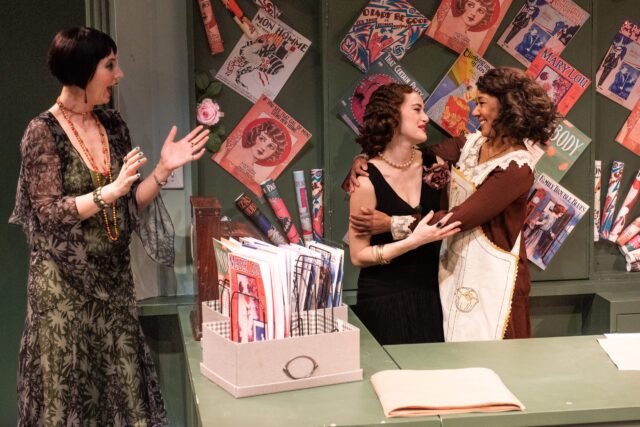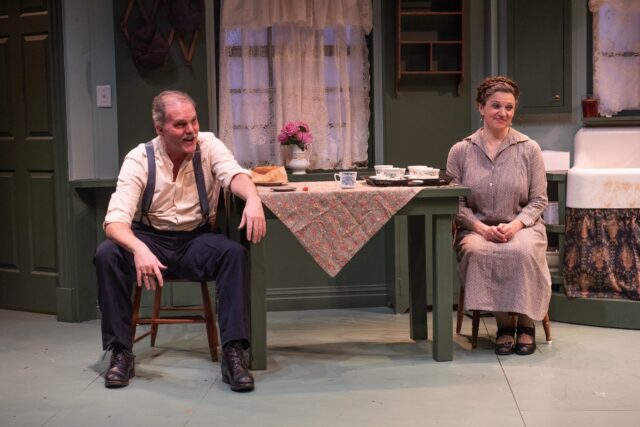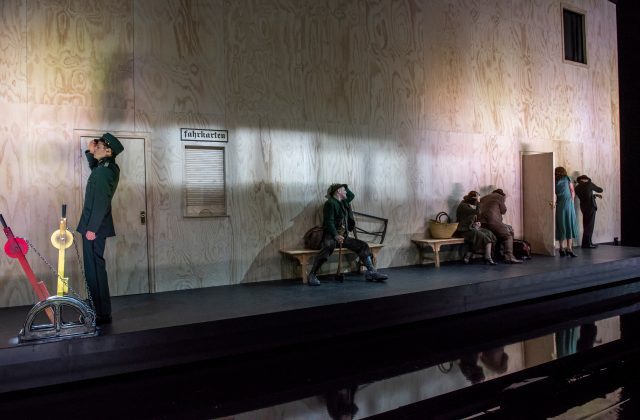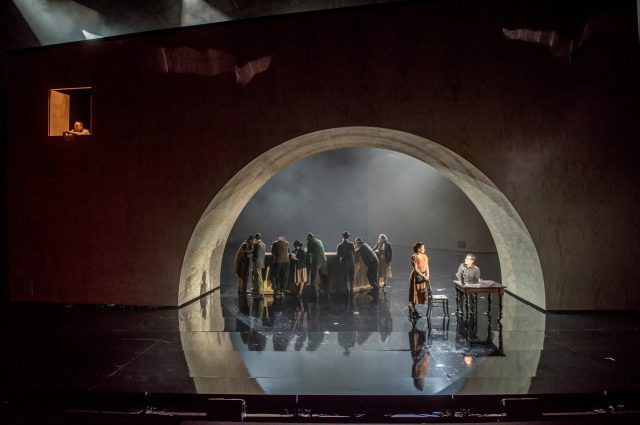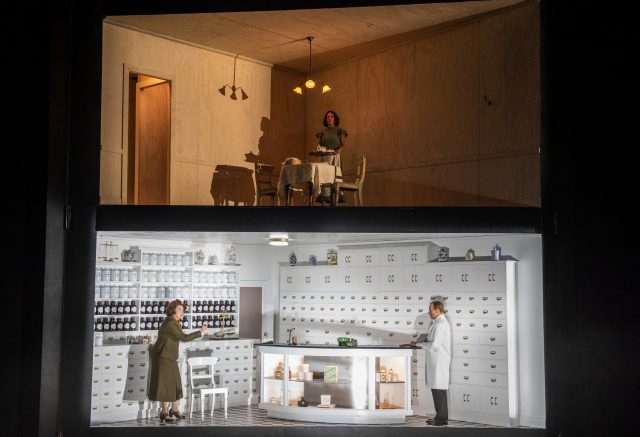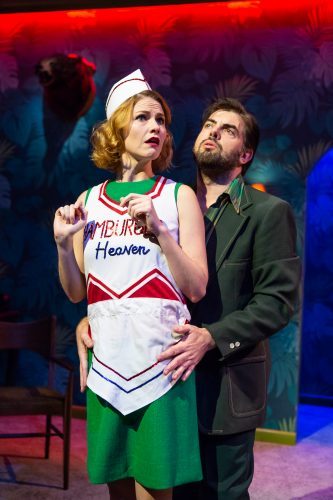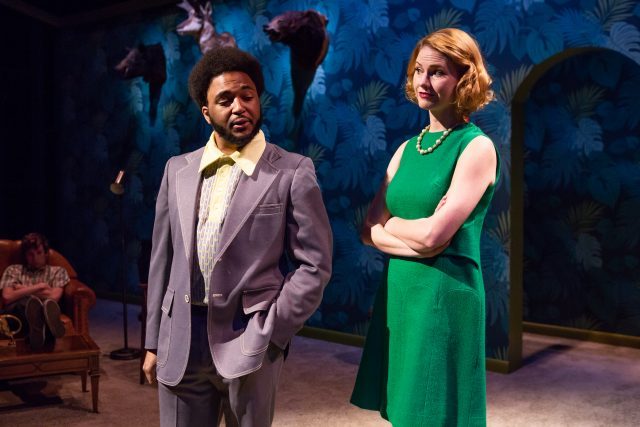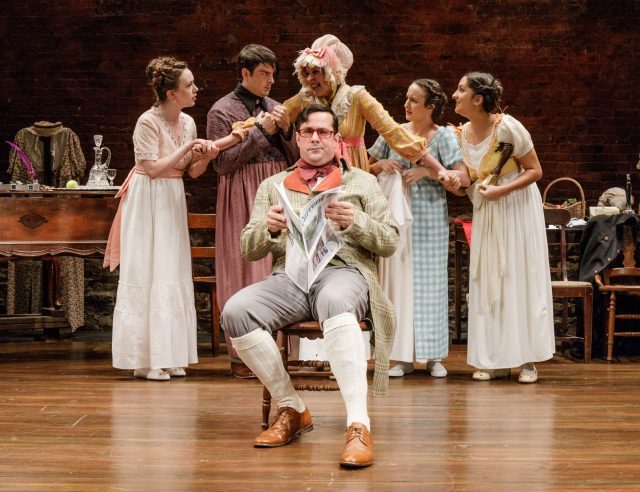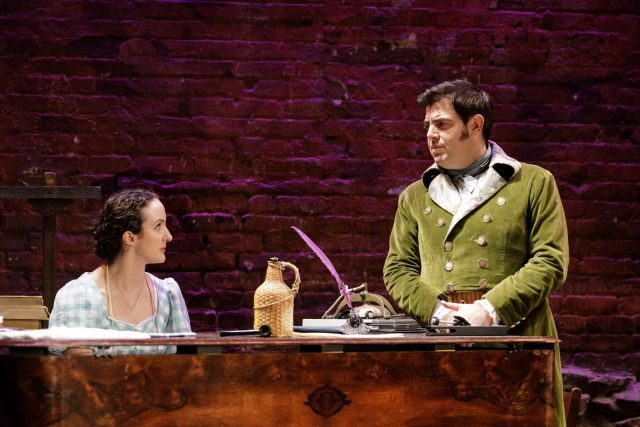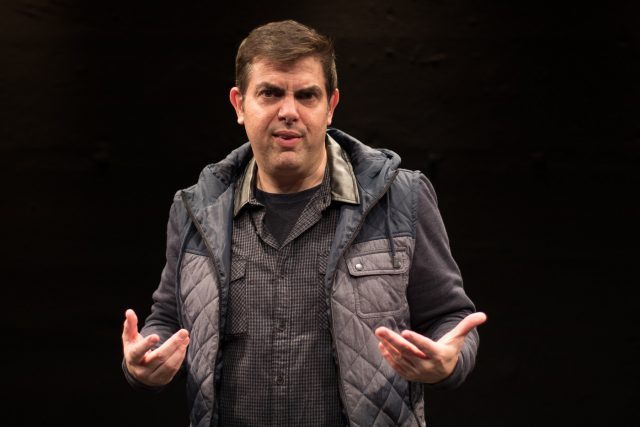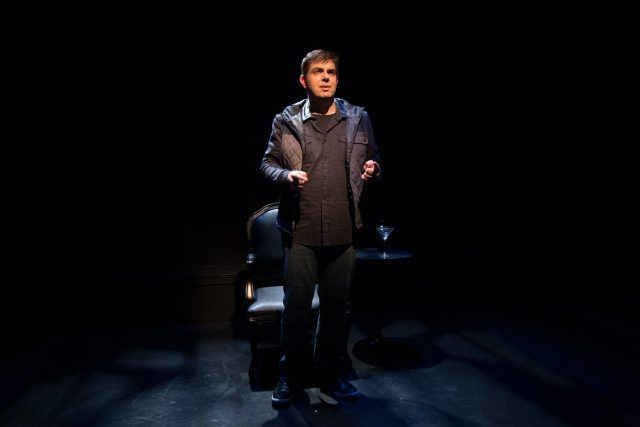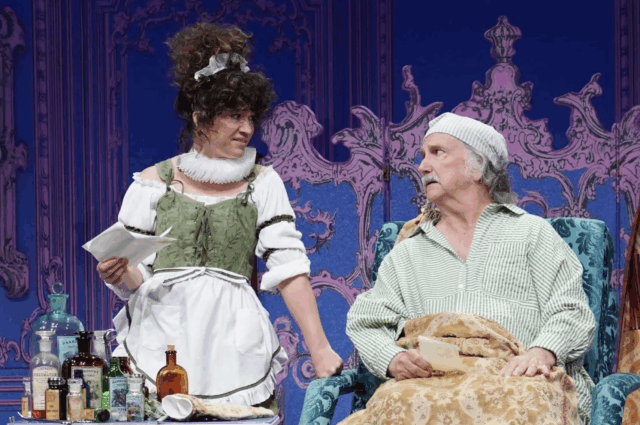
Sarah Stiles and Mark Linn-Baker stand out in Red Bull adaptation of Molière’s The Imaginary Invalid (photo by Carol Rosegg)
THE IMAGINARY INVALID
New World Stages
340 West Fiftieth St. between Ninth & Tenth Aves.
Wednesday – Monday through June 29, $69-$140
www.redbulltheater.com
newworldstages.com
Two madcap farces loosely based on Molière satires about wealth and class are currently running off Broadway, and both throw everything at the wall, hoping enough will stick. One succeeds significantly more than the other, but neither turns out to be exemplary.
In 2017, writer Jeffrey Hatcher and Red Bull artistic director Jesse Berger teamed up on a hilarious adaptation of Nikolai Gogol’s 1836 The Government Inspector, taking aim at health care, education, the court system, surveillance, class distinction, poverty, power, the institution of marriage, and government itself. They followed that up in 2021 with an overbaked version of Ben Jonson’s 1610 The Alchemist, which also skewered health care and class distinction. Their latest collaboration, an adaptation of Molière’s final play, 1673’s The Imaginary Invalid, falls somewhere in between, a frantic comedy about money, loyalty, and faith in science, based on a new translation by Mirabelle Ordinaire.
Continuing at New World Stages through June 29, The Imaginary Invalid takes place on two-time Tony winner Beowulf Boritt’s flimsy yet elegant set, a Louis XIV–style blue and pink room with a dressing screen, a mobile hospital bed, portraits of Molière and prancing cherubs on the wall, and doors at either side that will be peeked through and slammed repeatedly over the course of eighty-five frenetic, if repetitive, minutes. The master of the house, Argan (a delightful Mark Linn-Baker), is a rich hypochondriac who spends most of his time in bed, in his pajamas, slippers, and night cap, complaining about various aches and pains, losing feeling in his buttocks, and evacuating his bowels at scheduled times. His maid, Toinette (a riotous Sarah Stiles), takes care of him in a cheeky manner, lobbing subtle, and not-so-subtle, bombs at him.
Argan’s daughter from his first marriage, Angélique (Emilie Kouatchou), has fallen in love with Cléante (John Yi), but Argan has just promised her to Thomas Diafoirus (Russell Daniels), the doofus son of his surgeon (Arnie Burton). Argan is also tended to by Dr. Diafoirus’s brother, Dr. Purgon (Burton), who takes advantage of Argan’s hypochondria, and Dr. Fleurant (Burton), an enema specialist who dresses like a low-rent Batman TV villain. Meanwhile, Argan’s second wife, the voluptuous but devious Béline (Emily Swallow), is plotting with her lover, the lawyer Monsieur de Bonnefoi (Manoel Felciano), to change Argan’s will so she gets everything and Angélique nothing.
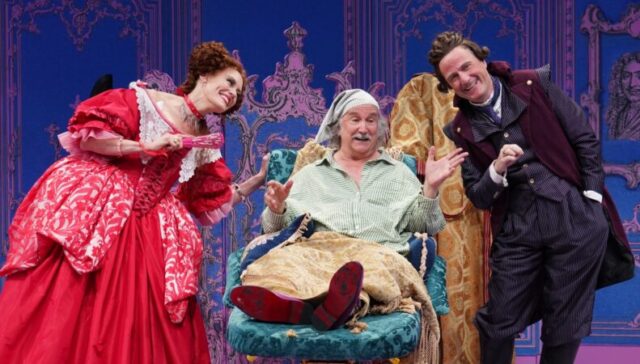
Béline (Emily Swallow) and de Bonnefoi (Manoel Felciano) try to trick Argan (Mark Linn-Baker) in Molière comedy at New World Stages (photo by Carol Rosegg)
The only one who is aware of all that is going on is Toinette, who relishes the insanity and inanity but is not about to lose her job over the scheming and deceptions.
Hatcher and Berger fill The Imaginary Invalid with inconsistent and intermittent fourth-wall breaking, clever and mundane anachronisms, self-referential inside jokes, playful props, and enough rear-end references that if I never hear another word about buttocks and enemas it will be too soon. But it’s also silly fun, even if it is more Three Stooges and Looney Tunes than Marx Brothers and Abbott and Costello, despite direct nods to Groucho and A&C.
Tilly Grimes’s costumes are a romp all their own, particularly the Joe “Stinky” Besser baby sailor outfit Daniels wears as Thomas, along with Béline’s lavish red gown and pouffy hairdo. Music director and composer Greg Pliska adds to the frivolity with parodies of such French songs as “La Vie en Rose,” “La Marseillaise,” “Hooray for Captain Spaulding,” and “I Dreamed a Dream.” Tracy Bersley’s movement choreography is appropriately frenetic.
At one point, when Toinette is arguing with Argan that he is getting bad advice from his wife and doctors, he says, “Look, when I’m sick, I call a doctor! When I want something dusted, I don’t call you because you don’t dust!” She answers, “I see. You won’t listen to me because I’m a servant.” Argan: “And a woman.” Toinette: “Well, if you need to hear the same said by a man, I refer you to Monsieur Molière.” To which Argan replies: “Molière! Molière writes plays! If I were his doctor, I wouldn’t prescribe him a single pill! I’d say: ‘Die, playwright, like a show without a star!’”
An ill Molière died on February 17, 1673, shortly after collapsing onstage during a production of The Imaginary Invalid that he was directing and starring in and which included the following lines: “To the Devil with him! If I were a doctor, I would be revenged on him for his impertinence, and when he was sick, I would let him die without relief. He would cry and beg in vain, but I would not prescribe him the least bleeding or enema, and would say to him, ‘Die! Die! Molière!, that will teach you to make fun of doctors.’”
The Imaginary Invalid makes fun of doctors and patients, of health care and the law, of greed and avarice, and of theater itself. “Is there a cure?” Argan asks. Well, both the Bible and the Mayo Clinic agree that laughter is the best medicine.

Taylor Mac reveals hypocrisy inherent in arts funding in Prosperous Fools (photo by Travis Emery Hackett)
PROSPEROUS FOOLS
Theatre for a New Audience, Polonsky Shakespeare Center
262 Ashland Pl. between Lafayette Ave. & Fulton St.
Tuesday-Sunday through June 29, $95-$125
www.tfana.org
A few years before The Imaginary Invalid, Molière wrote Le Bourgeois gentilhomme (The Middle Class Gentleman), the story of a rich bourgeois man obsessed with becoming an accepted member of the French aristocracy. Taylor Mac (who uses the pronoun judy) reimagines the play, now called Prosperous Fools, as a contemporary skewering of wealth, power, art, philanthropy, and celebrity, set at a gala fundraiser for a nonprofit ballet company. Adding elements from judy’s personal experiences at gala fundraisers — as a waiter, a guest, a performer, and an honoree — Mac delivers a frustrating, often confusing, and overly repetitive production that only settles down with a brilliant final monolog that spreads the blame for the terrible situation nonprofits find themselves in today.
Begun twelve years ago as a commission for an institution that ultimately rejected it, the show was turned down by numerous other New York City companies before being picked up by Theatre for a New Audience, which is presenting it at the Polonsky Shakespeare Center through June 29, directed by Tony and Obie winner Darko Tresnjak, who is unable to keep it from careening way out of control.
Mac stars as the Artist, who is choreographing a three-hour ballet relating the Greek myth of Prometheus, who stole fire from the gods and gave it to humans; he paid the price by being tied to a rock and having his liver eaten over and over again by an eagle throughout eternity. Just about everything that can go wrong does as the Artist, the dancer playing Prometheus (Ian Joseph Paget), and the three muses (Em Stockwell, Megumi Iwama, and Cara Seymour) prepare for the evening. The lights aren’t working, the orchestra doesn’t have the full score, and not everyone is thrilled that one of the honoree donors, dimwitted billionaire $#@%$ (Jason O’Connell), is morally and ethically challenged.
“I know you wouldn’t be able to do this work without $#@!$’s financial support, but he’s also a real estate petroleum mogul who makes pharmaceutical heroin out of endangered species,” the Intern (Kaliswa Brewster) says to the Artist, pointing out that the oligarch was also “that judge on that show where they made poor people compete for who could be the best beggar.”
The conversation continues until the Artist explains, “Buckle up! You want a life in the arts, this is what it looks like. You work for free, you beg for permission to ask for permission to do what you’ve worked for free to do, and after years of this humiliation, you finally break through, get yourself a patron, and he represents everything you’ve been fighting against your entire life. So organize the sheet music, fetch my coffee, and then go home and eat your top rhamen!”
The Philanthropoid (Jennifer Regan) readies to debase herself to both honorees, $#@%$ and glamorous actress and humanitarian activist ####-### (Sierra Boggess), whose main cause is helping impoverished children around the world. “I am not allowed happiness beyond the children,” she declares. ####-### is occasionally joined by a living prop, the Pot-Bellied Child (Aerina Park DeBoer), and uses the Intern, who is poor and Black, as an example of what is wrong with society. Walking around with a clipboard, the Stage Manager (Jennifer Smith) tries to keep everything running but doesn’t have much luck and takes offense when her clothes are ridiculed as those of “the working man.”
Meanwhile, $#@%$ demands that he needs his Wally Shawn in order to hang out with cultured people; American actor, writer, and living legend Wallace Shawn, he of The Princess Bride, Young Sheldon, My Dinner with Andre, and so many other beloved classics, is not available, so the Artist dresses up as him and fairly adequately speaks like him. “Couldn’t you hire the actual Wally Shawn?” the Artist asks. The Philanthropoid responds, “Money can’t buy everyone.”
As the gala proceeds, so does the mayhem, which describes the production as well.

The Intern (Kaliswa Brewster), $#@%$ (Jason O’Connell), the Philanthropoid (Jennifer Regan), and the Stage Manager (Jennifer Smith) aren’t the only ones who are confused about Prosperous Fools (photo by Hollis King)
Taken individually, Prosperous Fools should be another blast by Mac, whose previous works include Gary: A Sequel to Titus Andronicus, The Lily’s Revenge, and A 24-Decade History of Popular Music. Alexander Dodge’s set, with an Astor Plaza–like cube, square plastic swimming pool, and headless animals, is a hoot, as are Anita Yavich’s costumes, although $#@%$ dressed as Elon Musk in the first act and Donald Trump in the second feels like overkill. The boisterous choreography is by Company XIV’s Austin McCormick, with music by Oran Eldor.
However, there is too much of everything. Jokes go on too long and are repeated, the purposeful overacting grows tiresome, and, something I thought I’d never say, no more Wallace Shawn, please! Many of Mac’s points are currently being made in the Amazon Prime series Étoile, which deals with a dancer swap between Paris and New York, a worrisome gala, an ethically and morally challenged oligarch throwing his money around to get whatever he wants, along with an eclectic choreographer who believes he is misunderstood. (DeBoer is in both Étoile and Prosperous Fools.)
The show concludes with a marvelous monolog by the Artist that brilliantly narrows down what it’s all about, making each and every one of us complicit in the hypocrisy without even mentioning DOGE — performers, choreographers, donors, artistic directors, woke gatekeepers, and, perhaps most courageously, the audience. “Do you deserve because you try? / And do you own what you can buy? / Does charity absolve your greed? / Does wanting much make others need?” he asks. “Is selling out what you deplore? / And how then have you been a whore? / Should you be thanked for being wealthy? / Should you be shamed, is that unhealthy?”
Both The Imaginary Invalid and Prosperous Fools could use a second opinion. Calling Dr. Howard, Dr. Fine, Dr. Howard!
[Mark Rifkin is a Brooklyn-born, Manhattan-based writer and editor; you can follow him on Substack here.]

